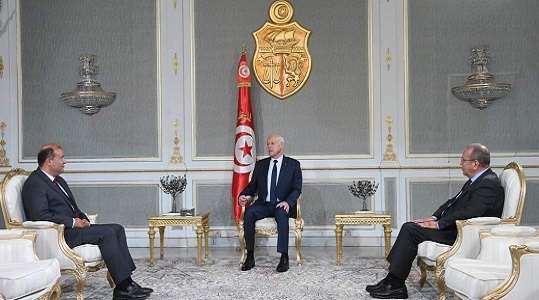Tunisian President Kais Saied met, at the Carthage Palace, the Secretary-General of the Union of Arab Chambers, Dr. Khaled Hanafi, who is currently visiting Tunisia, in the presence of the President of the Tunisian Federation of Industry, Trade and Handicrafts Samir Majoul.
The meeting touched on the efforts made by Tunisia to attract investments and provide the appropriate environment for that, in addition to the role of the Union of Arab Chambers in developing the intra-regional trade pattern between Tunisia and the Arab countries and the rest of the regional blocs. The role of the private sector in achieving development, financing projects and supporting start-ups and business incubators in Tunisia was also discussed.
The President of the Republic, Kais Saeed, stressed the importance of the historical role of the Arab Chambers in building economic cooperation relations, and creating new investment opportunities in Arab countries outside the traditional foundations that experience proved that they did not achieve the desired goals.
For his part, Secretary-General of the Union of Arab Chambers, Khaled Hanafi, praised this meeting, in light of the common desire to find new Arab labor markets aimed at reducing unemployment and linking the Tunisian and Arab economy to its Arab and regional environment, stressing that Tunisia possesses all the capabilities required to achieve this goal.
He said: "We are very pleased that His Excellency President Qais Saeed has received us, in my capacity as Secretary-General of the Union of Arab Chambers, which represents the Arab private sector, the meeting touched on Tunisia’s role and its economic importance in terms of attracting foreign investments and encouraging its trade relations with its Arab brothers and between it and the rest of the world.”
He continued, "The talk focused on multiple axes, and the first axis, which is a very important axis, dealt with the issue of entrepreneurship and creating business incubators for young people to play their role by implementing projects that are incubated and promoted through the private sector." Considering that "financing is essential and important for transforming entrepreneurial ideas into projects that are promoted in Arab and foreign countries, which ultimately leads to creating greater job opportunities for young people, and accelerating the turn of the economic wheel."
He pointed out that "the second axis dealt with the necessity of a logistical and maritime link, to link Tunisia with some ports, especially the ports of the Arab Republic of Egypt, so that it would turn into a carrier for trade and business, which would encourage attracting investment to Tunisia."
He noted that "the importance of Tunisia hosting, under the auspices of His Excellency President Kais Saied, an Arab business and investment conference, which serves as a prominent window for attracting foreign investments into Tunisia, was also discussed."
He continued, "The importance of trade, economic and investment openness in Tunisia was also discussed, especially in light of the existence of laws that protect the investor and business owners greatly."
Hanafi stressed that "the purpose of the meeting was to provide support to Tunisia, especially since there is a strong desire on the part of the Tunisian leadership to improve the economic reality and a real desire to create many job opportunities for Tunisians and Tunisian youth, this can only be achieved through the creation of organized labor markets, which contribute to providing real job opportunities, leading to a significant increase in production and gross domestic product. From there, the emphasis was placed on the importance of opening up to the world through the implementation of joint projects, through which Tunisia will be the hub from which these investments are launched to different regions of the world.”
He called for "the necessity of working to link Tunisia with some Arab ports so that Tunisian products can depart from these ports to Africa, Asia and other regions of the world."
He referred to “the prominent role played by the Federation of Chambers of Commerce, Industry and Handicrafts in Tunisia headed by Samir Majoul. Today, the Federation plays the role of economic diplomacy. The Federation has turned into an ambassador for Tunisia in Arab and foreign countries, and is promoting Tunisia everywhere.”
Source (Union of Arab Chambers)

